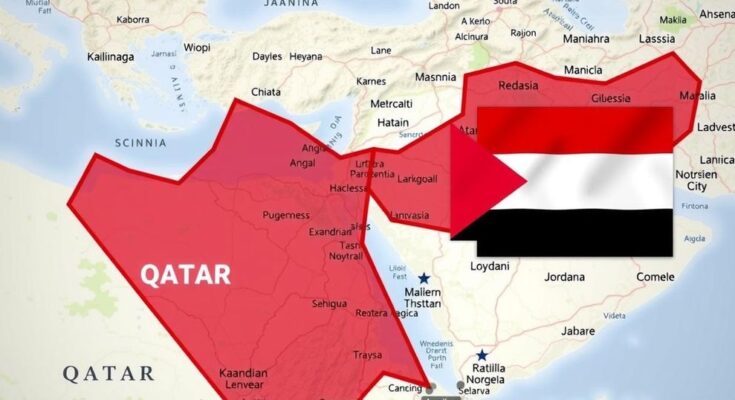Qatar and Jordan have condemned an Israeli map claiming historic rights over Palestinian, Jordanian, Lebanese, and Syrian territories. The map, shared on social media, alleges ancestral boundaries and threatens regional peace, according to both nations. Their statements emphasize the need for international action to uphold Palestinian rights and address the implications of such claims amidst ongoing conflicts.
Qatar and Jordan have issued strong condemnations against a controversial map published by the Israeli government that asserts historical territorial claims over significant portions of Palestinian, Jordanian, Lebanese, and Syrian territories. The map, shared on social media by the Israeli Foreign Ministry’s Arabic language account, purportedly illustrates the ancient boundaries of the Kingdoms of Israel and Judea, as recorded in Biblical texts, extending beyond the Jordan River. The caption accompanying the map claimed that the Kingdom of Israel existed 3,000 years ago, prompting swift reactions from both nations.
The Qatari Ministry of Foreign Affairs denounced the publication as a blatant violation of international law and resolutions, emphasizing that such claims threaten regional peace, especially amidst the ongoing conflict in Gaza. It underscored the need for the international community to exert pressure on Israel to honor international legitimacy and cease its expansionist activities. Meanwhile, Jordan’s Foreign Ministry flatly rejected these claims, stressing their implications for Palestinian rights and sovereignty, and reaffirmed its support for the establishment of an independent Palestinian state defined by pre-1967 borders with East Jerusalem as its capital.
The tensions stem from a historical backdrop of Israeli territorial expansion, encompassing occupations of lands in Lebanon, Palestine, and Syria. Both nations’ statements reflect a broader regional response to Israeli assertions that frequently dismiss international calls for withdrawal from occupied territories and the establishment of a viable Palestinian state. The reactions from Qatar and Jordan underscore the fragile geopolitical landscape in the region, with potential repercussions for peace efforts.
In March 2023, Israeli Finance Minister Bezalel Smotrich also contributed to escalating tensions by presenting a map that included Jordan within a depiction of greater Israel, thus reinforcing concerns over Israeli policies that deny the rights of the Palestinian people. The cumulative effect of these actions reinforces existent tensions and highlights the urgent need for dialogue and resolution.
The conflict over territorial claims in the Middle East, particularly involving Israel, Palestine, Jordan, Lebanon, and Syria, has deep historical roots that stretch back several millennia. The Israeli occupation of Palestinian territories and neighboring lands has led to ongoing disputes regarding sovereignty, statehood, and the rights of the Palestinian people. The publication of maps asserting ancient claims serves as a flashpoint in an already delicate geopolitical environment, potentially exacerbating tensions between Arab nations and Israel, and undermining peace efforts in the region.
The contentious map published by Israel claiming historical rights over vast regions, including parts of Jordan, has prompted strong responses from Qatar and Jordan, emphasizing a collective Arab rejection of such assertions. These actions are viewed not only as violations of international law but also as direct threats to the establishment of a Palestinian state. The situation underscores the need for heightened international engagement to address the complexities surrounding territorial disputes and to foster pathways toward lasting peace and stability in the region.
Original Source: www.palestinechronicle.com




